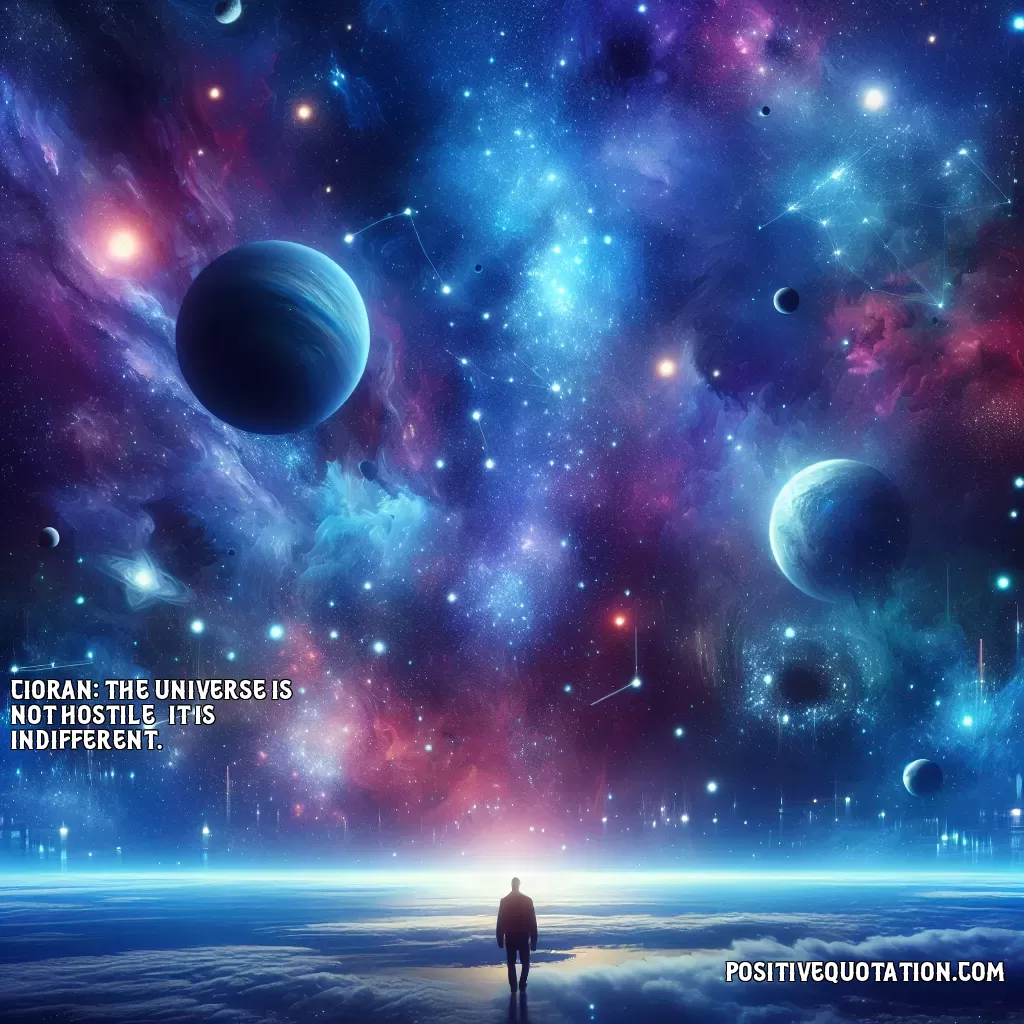
Cioran: The universe is not hostile it is indifferent.
Author: Emil Cioran
👁️ 7 views
The quote by Emil Cioran, "The universe is not hostile; it is indifferent," succinctly captures a fundamental existential and philosophical perspective that has been echoed by many thinkers. At its core, this statement suggests that the universe, or the vast cosmos in which we exist, lacks any inherent intention or purpose with respect to our individual lives or humanity as a whole. When Cioran describes the universe as indifferent, he implies that it operates on natural laws and processes that are not concerned with human experiences, emotions, or existence. This indifference is neither malevolent (hostile) nor benevolent. It's simply neutral. It reflects a viewpoint where the universe does not "care" about what happens to beings within it because caring or being concerned implies a level of consciousness and intention that the universe, as an entity, does not possess. This perspective can be both liberating and daunting. On one hand, it can be liberating because it frees individuals from the notion that there is some grand intention or expectation for their lives from a cosmic perspective. It can encourage people to find their own meaning and pursue their own paths without feeling pressured by the idea of a preordained purpose. On the other hand, it can be daunting because it confronts individuals with the absence of inherent meaning in the universe, which can lead to a sense of existential vulnerability or loneliness. Cioran's observation thus serves as an invitation to reflect on our place within the universe and how we create meaning and purpose in a reality that is, at its essence, oblivious to our existence. It challenges us to reconsider the significance we attach to our endeavors and encourages a deeper understanding of the human condition in relation to the cosmos.
Quote By: Emil Cioran
Emil Cioran, a Romanian philosopher and essayist, was born on April 8, 1911, in Rășinari, a small village in Transylvania. Known for his profound and often pessimistic insights into the human condition, Cioran's work traverses themes of despair, existentialism, and the absurd. His early education in Sibiu and later in Bucharest laid the foundation for his literary and philosophical pursuits. In 1937, Cioran published his first book, "On the Heights of Despair," which quickly established him as a notable voice in Romanian literature.
After moving to Paris in 1937, Cioran embraced the French language and began writing in it, ultimately becoming a significant figure in French literature. His unique style marries lyrical prose with philosophical reflection, and his works often delve into the bleakness of human existence. In the tumultuous backdrop of the 20th century, Cioran’s writings resonate with the disillusionment and uncertainty of the era. He became associated with the existentialist movement, although he often disavowed its more optimistic philosophies.
Throughout his career, Emil Cioran produced several notable works, including "The Trouble with Being Born," "A Short History of Decay," and "The temptation to exist." His writings are characterized by a deep, almost poetic exploration of themes such as suffering, mortality, and the futility of existence. Cioran’s philosophy, often steeped in nihilism, invites readers to confront the absurdity of life and the inevitability of death, prompting introspection on the nature of existence itself.
Despite his bleak outlook, Emil Cioran's influence extends beyond the confines of despair; he has inspired countless readers and thinkers with his incisive observations and stylistic brilliance. He lived in Paris until his death on June 20, 1995, leaving behind a legacy of philosophical insight that continues to captivate audiences around the world. Cioran remains a significant figure in literary and philosophical discussions, celebrated for his ability to articulate the complexities of the human experience.